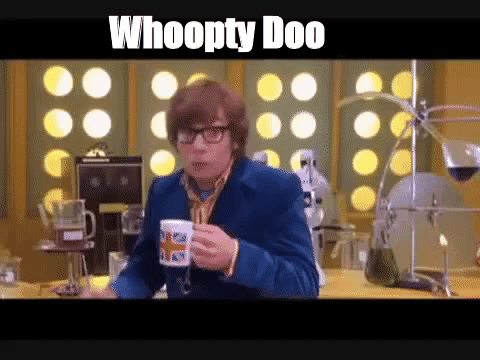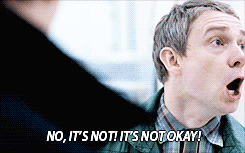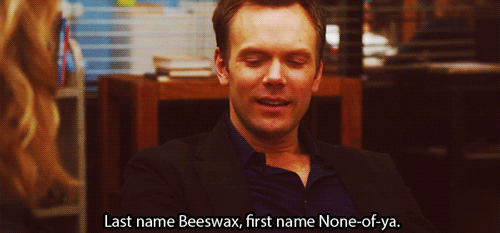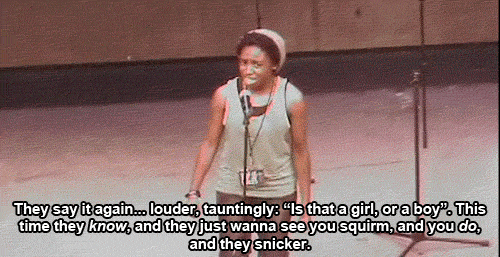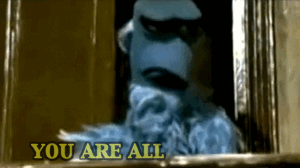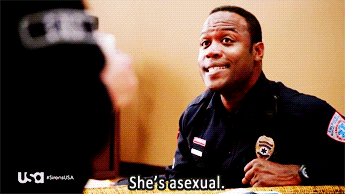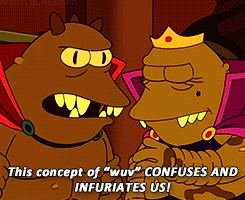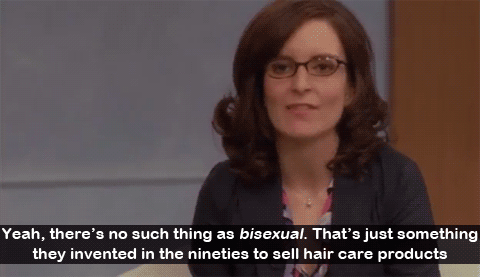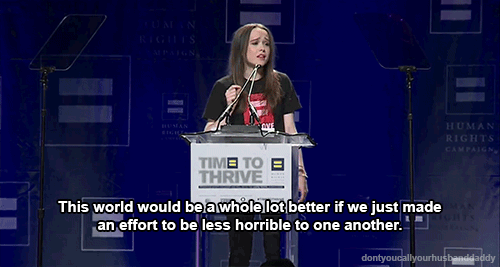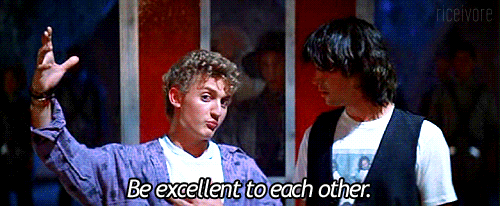Beginners Guide to GSRM: Gender, Sexual and Romantic Minorities
People...it's a tough world out there. Every day we see politicians and pundits complaining about how difficult it is to "keep up" with all of the social changes happening around people's sexual and gender identities. The LGBTIQA+ alphabet keeps getting longer as more people are politely asking to be recognised and have basic human rights. To that end, some communities have dropped LGBTIQA+ and replaced it with GSRM. As you can see from the headline above, this stands for Gender, Sexual and Romantic Minorities. This is a more inclusive acronym that helps to cover people in a variety of different circumstances more comprehensively. Today we're going to take a very, very quick look at some of those identities and what they mean*.
Medically speaking, sex is something that most of us can't really change. But did you know that there’s more than just two sexes?
The term Intersex refers to people who are born with atypical physical sex characteristics, which is to say they can’t be clearly defined as male or female. Intersex is a medically definable identifier and also hosts a community of amazing people who don’t fit a socially defined idea of sex.
The downside of this is that many of them are subjected to non-consensual hormonal treatments and even surgery to make them more clearly definable as one sex or the other. This is often done at an age when they can't consent and their parents are coerced into making a decision one way or the other, without knowing how their child is going to grow up identifying.
Not cool society. Really fucking not cool.
So while sex isn't really something we can control, gender is something that we can mould throughout our lives.
While I identify as a woman every day of the year and am comfortable being addressed as such, genderqueer people can identify anywhere on the gender spectrum. Or they might refrain from recognising gender at all and prefer pronouns of “they” and “them”.
To recognise this, some (read: not enough) governments and organisations have introduced a new mailing title, so instead of having to select from Mr. or Ms. you can chose Mx.
I'm personally a huge fan of this as it’s much easier to write on government forms than “None Of Your Damned Business. S. Buttons.”
Also, most of the time when filling out forms your gender identity is actually irrelevant and is usually only asked for the purposes of gathering statistics or for future advertising.
A person's genitals might indicate sex but they don't indicate gender. It's for this reason that you'll notice articles on this site referring to "penis owners" and "vagina owners" as opposed to men and women.
There’s a good chance that you'll have seen many prominent trans people in the media recently, which I personally hope brings more awareness to a group that deserves all the love and support we can provide.
A transgender person is someone who identifies as the opposite sex mentally, whereas a transsexual person is someone who identifies as the opposite sex physically. Transgender is also now used as a blanket term to refer to people who don’t identify with the sex they were assigned at birth.
Apparently this is something that lot of people find very difficult to wrap their heads around and as a result trans people are possibly one of the most marginalised groups in society. They suffer harassment, abuse, assault and even murder at rates spectacularly higher than anyone else in the GSRM community. As a result of this the suicide rate in the trans community is close to 50%.
If, like me, you identify with the sex you were assigned at birth, then you're a cis person, e.g. a cis woman or a cis man.
It’s crucial to acknowledge the importance of the cis label and try to embrace it where you can. Without the term cis we rely on incredibly problematic language like “biological woman” or “normal woman” which implies that there's any such thing as normal, or that one is better than the other.
Trans women are women and trans men are men. Some people argue that a trans woman can't be a woman because she doesn't have female reproductive organs, which is a nice way of being offensive to both trans women and cis women who have had hysterectomies. Well done on being an asshole to two marginalised groups.
To think that trans people aren't equal to cis men and women simply because one small aspect of them doesn’t match up with what we’re taught to expect from a gender is not only incredibly hateful, it’s also just damned stupid. It would be like calling “Annie Hall” a bromance , because Diane Keaton spends the entire film in “men’s clothing”.
Most of us are familiar with the idea of sexuality. We know that who we’re attracted to isn’t something that we can decide, it just is.
If you’re a straight person, you can’t help but be attracted to the opposite sex. The idea of being with someone the same sex as you might seem weird, unusual or even impossible, but hopefully you understand that homosexual people feel the same way about being straight.
Sexual preference is something that we inherently feel and isn't something that we can change at will, and even though to varying degrees we can change the way we act on it, most of the time we as a society acknowledge that we shouldn’t have to.
Personally, I can’t understand how something as insignificant as sex or gender could decide whether or not you’re attracted to someone. The idea of arousal, attraction, desire, etc being determined by the junk in someone’s trunk seems like such a strange concept to me. But I know that none of you oddballs has any more say in who you’re into than I do.
What many of us can forget is that sexuality and even romance are not binary issues. It’s not just gay or straight. Bisexuality is the attraction to both sexes, although most bisexual alliances will acknowledge that there is more than one gender and now define bisexuality as an attraction to more than one gender over the course of a person’s lifetime.
Pansexuality is an easier way of describing the same concept (and is etymologically less exclusionary), but is also a much less common term and thus requires its own explanation whenever it comes up at dinner parties.
The sexual and romantic identities converge with Demisexuals. Demisexuals are only sexually attracted to people with whom they have a strong emotional connection. This doesn't necessarily mean romantic, but it means they're not going to be out clubbing looking for a hook up.
There are asexual people, who do not experience sexual attraction at all. Don't confuse asexuals with people who have made the choice to be celibate. Asexuals have as little choice in their sexual attraction as you and I, whereas celibates might still feel sexual attraction but elect not to act on it. Grey-sexuals are people who rarely experience sexual attraction, but can occasionally.
And trust me, given the treatment a lot of asexuals receive at the hands of both the straight and LGBTIQ community, asexuality is not something most people would actively chose to put themselves through, if it were a matter of choice.
Asexuals have relationships every bit as much as you and I have, they just don't have sexual component.
Then there’s our romantic identity. Just because you’re sexually attracted to one or all genders, doesn't mean that you're romantically attracted to them as well.
For instance, you might be bisexual, but heteroromantic. This would mean that you are sexually attracted to multiple genders, but only romantically attracted to people of the opposite sex. A romantic attraction is the difference between having a sexual partner and a life partner.
Aromantics are people who don't feel romantic attraction towards anyone. And grey-romantics are people who very rarely experience romantic attraction to anyone. This is in contrast to the majority of our society which sees romance as the ultimate point of all social interactions with people you're attracted to.
And then there's relationship identity, such as monogamy and being monogamish (thank you Dan Savage). There's also polyamory, open relationships which we've covered on this site before.
The important thing to remember with gender, sexuality and relationship identity is that it's constantly evolving. At various points in history and in various parts of the world it has been unacceptable just to be gay. We’re still living in an age when bisexuals are harassed by both straight people and gay people during the goddamn pride parades, because a lot of people still feel that we’re not picking a side or we’re not “gay enough” to call ourselves queer.
If you ever want to make yourself cry, do a google image search for “acephobia” (the bigotry directed towards asexuals) and read the resounding stupidity of thousands of people who believe that not experiencing sexual attraction isn’t possibly something that can happen.
If your soul isn’t completely battered after that, why not destroy it utterly by reading Section 88 of the Australian Senate Inquiry into the forced sterilisation of people with disabilities, including intersex people.
Or perhaps the UN report into the torture and non-consensual surgery performed on intersex people.
And I'm not even going to dive into the black hole that is societies pervasive transphobia, since to be honest I don't want to direct any traffic towards anything that might even vaguely be supporting it.
My point is that while many people today might look at our incredibly diverse gender and sexual rainbow and say “Oh yeah, gay marriage is the only thing standing between you all and equal rights”, I would argue that there’s still a fucking long way to go before we’re even close to equality.
So have a think about the way you identify yourself.
Think about the way you want people to see you and the kinds of people you're attracted to.
You might be gay or straight, you might be cis or trans, you might be a man, a woman, both or neither.
You might be asexual or aromantic, you might be monogamous or polyamorous.
You can call yourself whatever you want and identify in whatever way makes you the happiest.
But ultimately, the only label you really don't want to be attached to is 'bigot'.
So if you meet someone and they identify with a sexuality you're not familiar with, or as a gender you didn't immediately associate them with, the correct response is to just smile and be nice, the same as you would with anyone else.
Because the one thing most great people in this world have had in common is a desire that we be kind and good to one another to help create a better world.
That is all.
You may go now.
* In this article I am discussing many issues and identities that don’t necessarily apply to myself. I am not in any way speaking for, or on behalf of the people who identify in any of these ways. If you are curious about anything mentioned in this article I encourage you to reach out to the various support organisations linked throughout this article.

